Did someone forward you this? Subscribe here free!

Saginaw, Michigan
Much of this city looks forgotten. But every four years, the presidential candidates remember it.
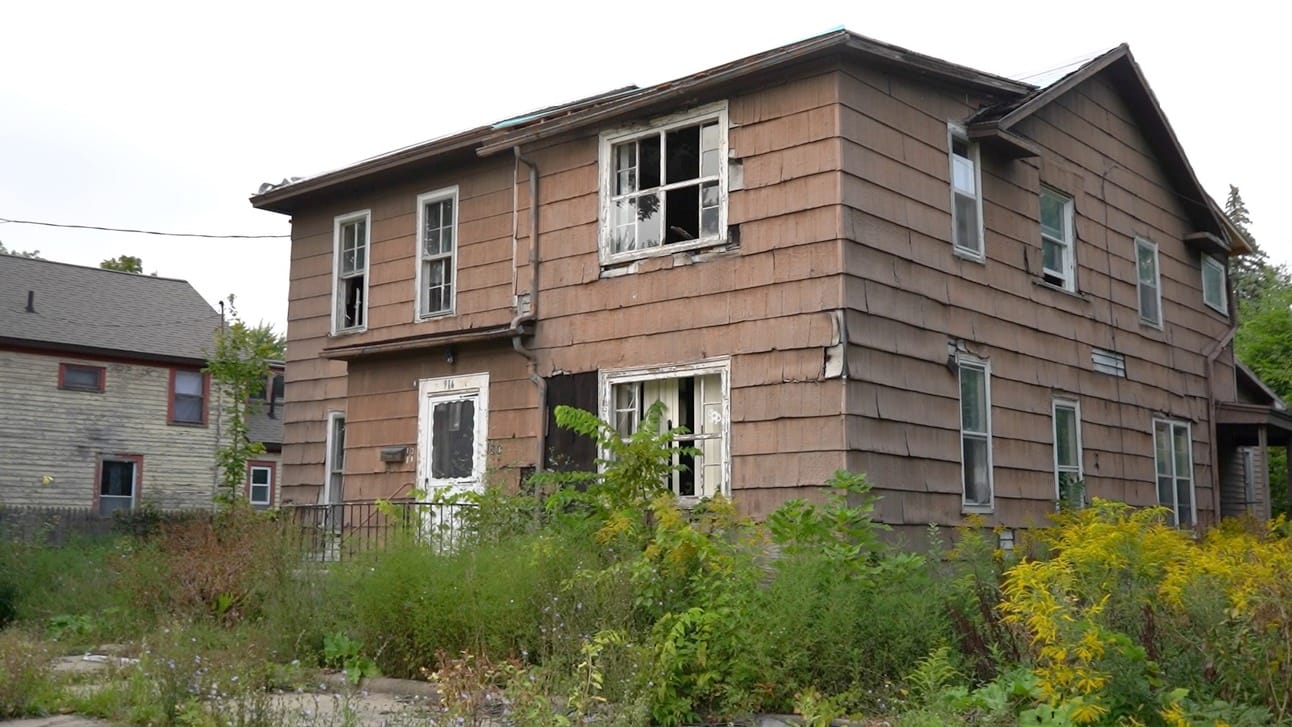
Saginaw, Midland, and Bay City make up Central Michigan’s “Tri-Cities” region. It’s said that if a candidate wins here, they’ll probably win Michigan and then the US.
The Tri Cities are each distinct: Bay City, on Lake Huron, was once a hub for GM’s steering division. Situated where the thumb of Michigan’s mitten meets the finger, it’s since seen its industry collapse, leading to widespread job loss and poverty. The median household income is $45,000.
In Midland, Michigan, just 15 miles to the west, incomes are double that. Midland is home to Dow Chemical, a $36B company that produces the chemicals used in everything from make-up to golf balls, napalm, and astroturf. Dow’s headquarters provides significant blue-collar employment and attracts white-collar executives from around the world. In Midland, Dow is everywhere: There’s a Dow garden, Dow bank, Dow baseball field, and Dow library. Midland’s median household income is more than double that of Bay City.
One Roca reader from Midland told us, “I grew up across the street from the Dow family, discovered my love of reading at the Grace A. Dow library, spent summers playing in Dow Gardens, watched ball games at Dow Diamond, and am a proud graduate of Herbert Henry Dow High School.”
The third Tri City, Saginaw, used to be a company town like Midland. Except the company – GM – has mostly left, leaving behind a partially abandoned, high-crime city where people say there are few jobs or opportunities and gang violence is rampant. Saginaw’s population is 44,000, down from 98,000 in 1960.
Saginaw looks and feels like a left-behind city. But politicians remember it every four years: Since Michigan went to Trump in 2016 and became a purple state, Saginaw County has emerged as Michigan’s key bellwether. Analysts look at Saginaw as the key indicator of how Michigan will vote.
Roca visited the Tri Cities area to see how the parties planned to achieve victory this November – and how the people who lived there planned to vote.

Our first stop was the Bay City Democratic campaign office. Situated right on the city’s main street, we walked in without prior notice and were greeted by a friendly young man. We told him what we were doing and he quickly introduced us to three middle-aged women setting up lawn signs in the back. One lady wouldn’t talk, but the other two would.
One woman summed up her politics as such: “We're not going back.”
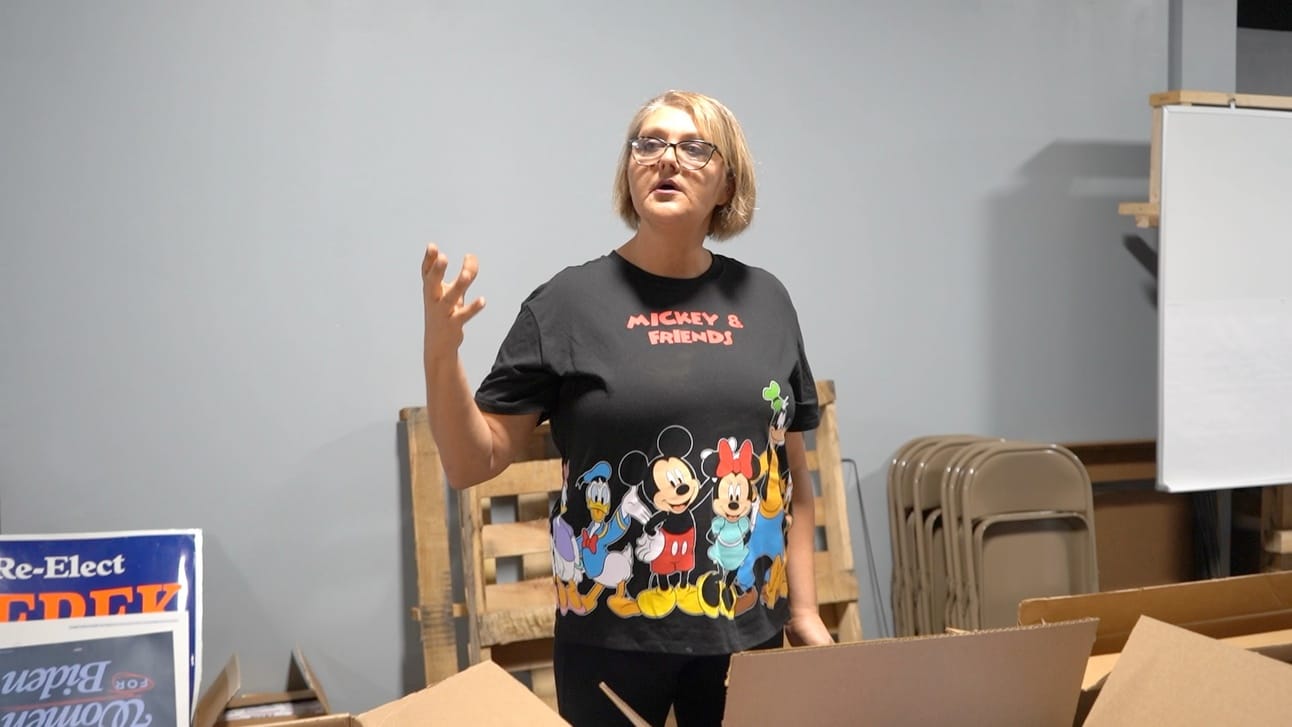
We asked what that meant.
“It means we don't want our daughters to have less reproductive freedoms or less decision over their own body than I have. It means that we are not going back to where this is an all-white country, and if you're not white enough, you're nothing. Because that's exactly what the other side is pretty much spewing.”
“One of them on Fox News said retards should be seen and not heard. And that's the Right. And that's what we're fighting against.” (We couldn’t find the instance she was referring to, if it exists.)
They said the biggest issue in Michigan was “reproductive freedoms,” and added that the Republicans “suck it on that.”
When we asked about the economy, she insisted it was fine: “Some people aren't doing better because of bad decisions and they want to blame somebody…You’ll notice the poor tend to vote for the right, yet the right seems to never help them.”
We pressed her on some other issues of potential importance to swing voters, beginning with immigration. She predicted the border would matter nationally but not much in Michigan.
Then we asked what she thought about laws passed in states like California that say schools don’t need to tell the parents when a child changes their pronouns.
She responded, “I have no problem with the child exploring their feelings and themselves, because if you hold that back, when they get older, there's lots of suicide. So, you know, I have no problem with the transition itself.”
“I wear woke with pride,” she added. “I don’t think that woke is a bad thing. You know, you can be Baptist and not agree with everything [the church says].”
The second volunteer, who was black, gave different reasons for supporting Harris: “When they say ‘Make America great again,’ to me, it means ‘Make America white again,’” she said, alleging that Trump fueled an increase in racism.
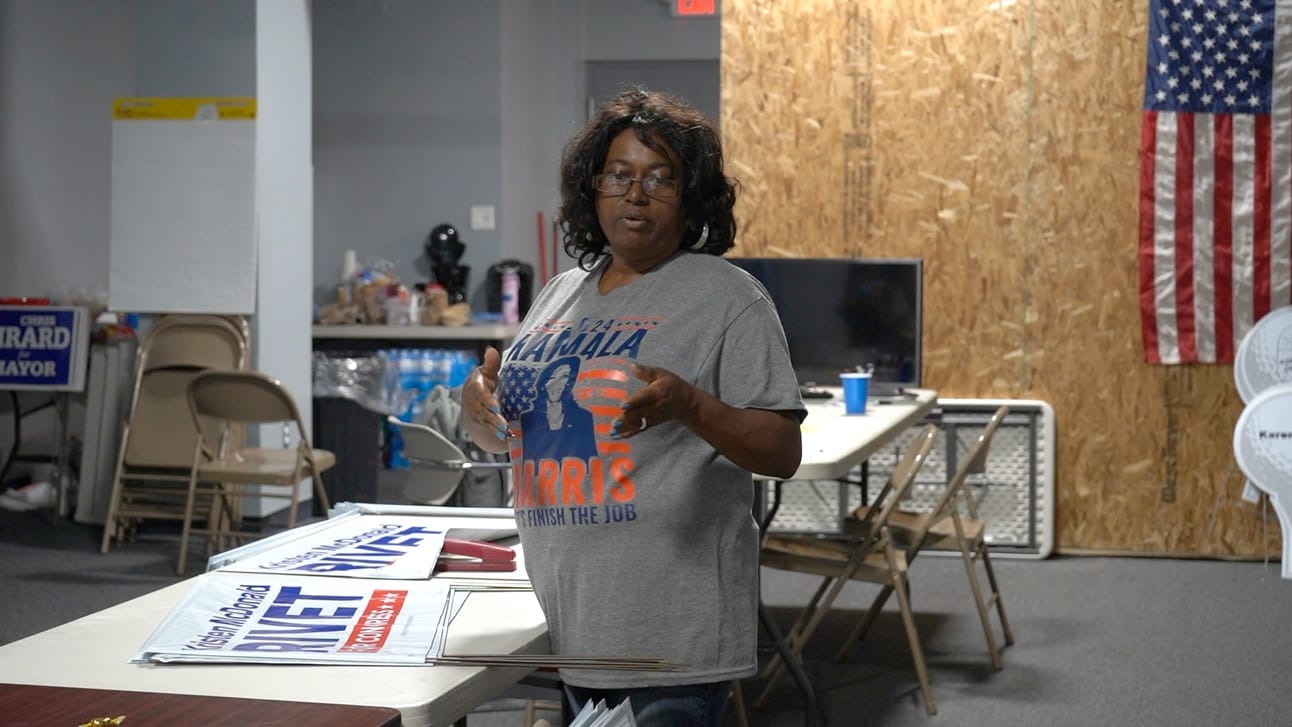
Growing up in Bay City, she said, “People never called me...anything but my name. But my kids have been called all kinds of different names.”
Overall, she said, things had gotten worse in the Tri Cities.
“So much has changed…So many people lost their jobs. So many people moved away, just gave up their homes and moved away.” She said that resulted in smaller, worse schools, and a lower quality of life. “It’s deteriorating,” she said.
She also pointed to a range of social ills: Gun violence, fewer people going to church, drug addiction, nudity on television. Meanwhile, she said a weak economy meant that her children were struggling to earn enough to provide for their families. She floated putting prayer back in schools as one potential answer.
Her talking points could scarcely have been more different from her progressive counterpart’s. Yet despite different concerns and backgrounds, both Democrats had found common ground in their mission to defeat Donald Trump.

After speaking to the Bay City Democrats, we went to the address of the Republican office. Except when we got there, there was nothing: No sign, no door, no campaign effort.
So we went to the Trump campaign office in Midland, 20 minutes away.
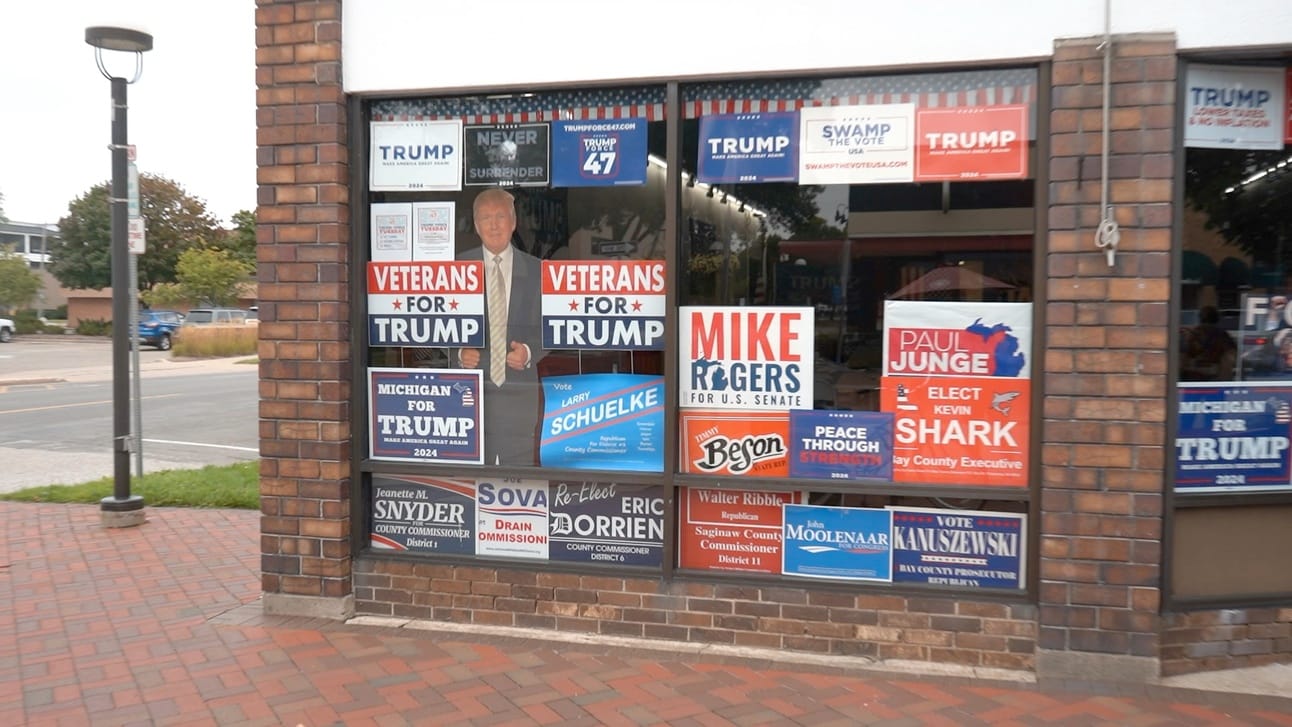
A young man greeted us and then turned hostile when we said we were reporters. His manager came out and told us to leave; no press allowed – “campaign policy.” He directed us to the Republican county office across the street, but that was also closed.
The Bay City Democrats couldn’t have been more welcoming; the Republicans couldn’t have been colder. It made us wonder what the Republicans were doing: With an election weeks away, only one of three offices in a crucial swing district were functioning.
We routed to another Republican office, this one billed the “Trump Shoppe” and located in a rundown strip mall outside of Saginaw, the largest city in the area. They couldn’t have received us more warmly.
The Trump Shoppe was opened by a Saginaw woman in 2016 after she saw Trump speak for the first time.
“When I heard Trump talk, I'm going, ‘Wow, this guy, he's gonna win!’...He had the qualities of integrity, honesty. I could tell you could trust him. Nobody owned him, you know? He had his own money, he wasn't taking any special interest money.”
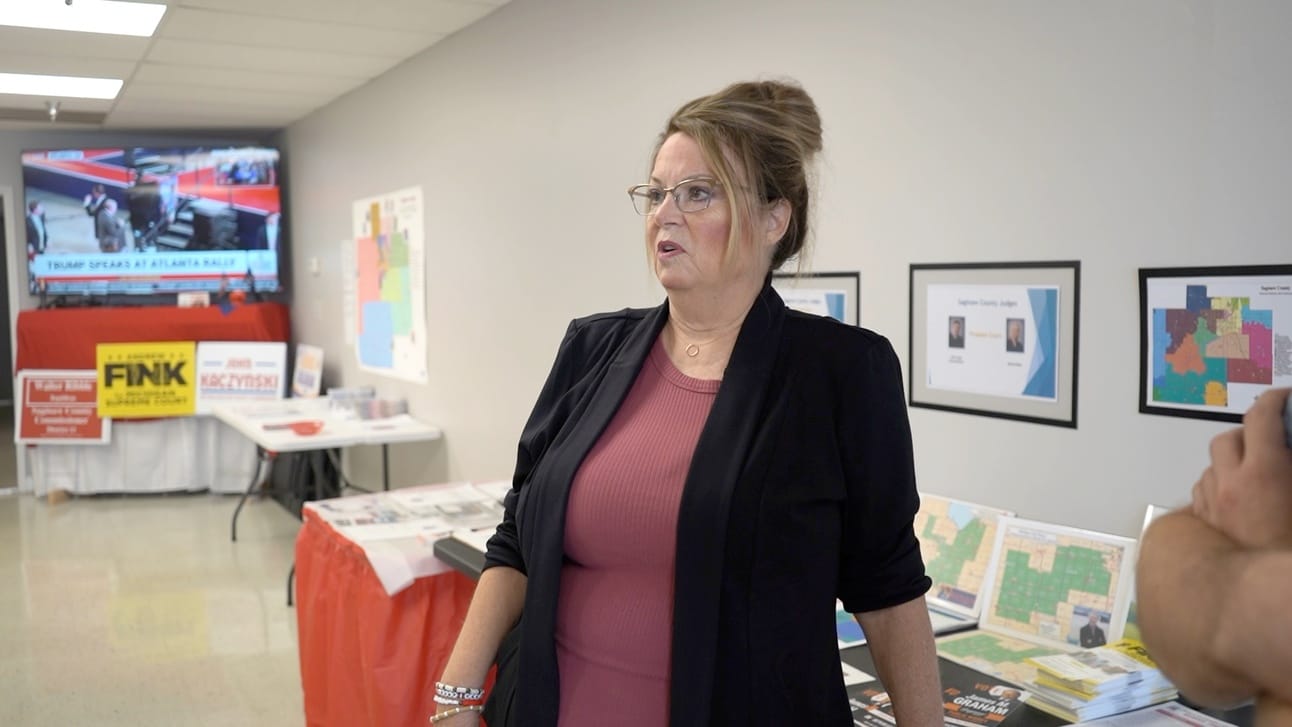
She had been campaigning for Trump since 2016, when she and her fellow volunteers got their strip mall location and opened the Trump Shoppe. “We had Democrats coming in in droves in our little tiny office, and they kind of looked around before they came in because these are union voters who are gonna defy their union bosses, right? And they're not gonna vote for Hillary.”
Trump ended up winning both Saginaw County and Michigan in one of the great upsets of 2016. It was the first time a Republican had done so since Ronald Reagan.
There was a group of local Republican candidates strategizing in the office, as well as people shopping for Trump gear: Bobbleheads, Trump/RFK/Vance yard signs, MAGA hats. One of the men we spoke to was a retired unionized GM worker who had been laid off from seven different GM plants. He said it’s difficult to overstate the shift in Michigan voting: 20 years ago, a union worker would never publicly support a Republican for fear of retaliation. Now, they have “UAW for Trump” in their front yard, he said, asserting that it’s because Trump is “not a union hater.”
Another man introduced himself as a cannabis farmer and marijuana reviewer for High Times, the weed magazine. He believed Trump could go against Big Pharma, which he accused of obstructing national legalization of medicinal marijuana.
While all the staff were middle-aged or older white people, the store’s customers included Hispanics and young people, both men and women.
We asked the lady who opened the office whether she had anticipated Trump’s defeat in 2020. She cut us off: “He didn’t lose though. I know you don’t want to hear that, but he didn’t lose.”
“We walked out of our office the night of the election about 9:30 PM and he was up 70-some percent in Saginaw County…And then everybody went to bed and they found some more votes that they needed. Truckloads. Truckloads!”
When we said there was no evidence to substantiate this, she and a fellow volunteer told us we were wrong. “The evidence has never been looked at….Every court it went to never looked at any of that evidence.”
We asked what the biggest issues in Saginaw are this year.
“Well, we support life at all stages, protecting all life,” she said, but then pivoted.
“We all have issues that we vote on…But what good are any of the individual issues if you’ve lost your freedom or if we have a deluge of illegals coming in, taking our votes away, taking our rights away? What good is it if we’re not safe as a country? If we’re being invaded?”
“It's not the Democrat Party that most people think it is. It’s like a downward spiral towards communism right now.”
We asked: “Do you think Kamala Harris is a communist?”
“Yes.”
Was there any chance Trump could lose this year?
“If they don't cheat like crazy, Trump's going to win. They're going to have to really cheat big time,” she said. A nearby man said Trump would get 100M votes, an amount no candidate has ever won.

“Is there a scenario where Trump loses and you would consider it a legitimate election?” we asked.
They thought about it: “They’d have to prove it,” the man said.
“We don’t trust,” the woman added.
“And the numbers wouldn’t do that?”
Both replied: “No.”

So how did the people of Saginaw feel?
After driving past an abandoned Blockbuster and a series of vacant strip malls, we reached a residential neighborhood that looked like it could have once been nice. The first person we spoke to was a man outside his home. We asked, “What is Saginaw like?”
“It’s like hell,” he said. He added, “My house got broke in by a 12-year-old and a six-year-old,” as if that was all we needed to know about the city.
He said he had lived in Saginaw for 50 years and that it had only gotten worse.
“Midland’s so much better, cleaner, healthier…decent people there,” he said. “People around here are dirty, mean, back-stabbing…Everybody, you gotta watch your back. You can’t trust anybody.”
Nearby, we met a woman cleaning out her house.
“This used to be a great neighborhood. It was tree-lined…everybody had a porch, everybody visited with each other….And there were always tons of kids in the neighborhood.”
Most of the families worked in the automotive industry, though, and in the 1970s, those factories started to leave. Real estate values started to fall, people moved out, and homes were left abandoned.
Now, the lady said, people are gone and “safety is bad.”
She declined to share who she’d vote for, but her sister didn’t hesitate: “I’m gonna vote for Trump.”
The further we went into the neighborhood, the worse it got: Fewer people outside; more abandoned homes. The blocks looked like they could have been great places to live: Large homes on nice streets with front porches and yards. But the roads were in terrible condition and some blocks were more rotting than in-tact.
What we were seeing was “urban blight” or “urban decay,” something that exists in poor regions across the US but is particularly acute in places like Saginaw that rapidly lost population. In 1960, Saginaw was a thriving manufacturing hub. Today, its homicide rate – 43 per 100,000 – would rank it third among large American cities, between Baltimore and Detroit.
Two men sitting on their porch told us “you have to be heartless to survive down here.”
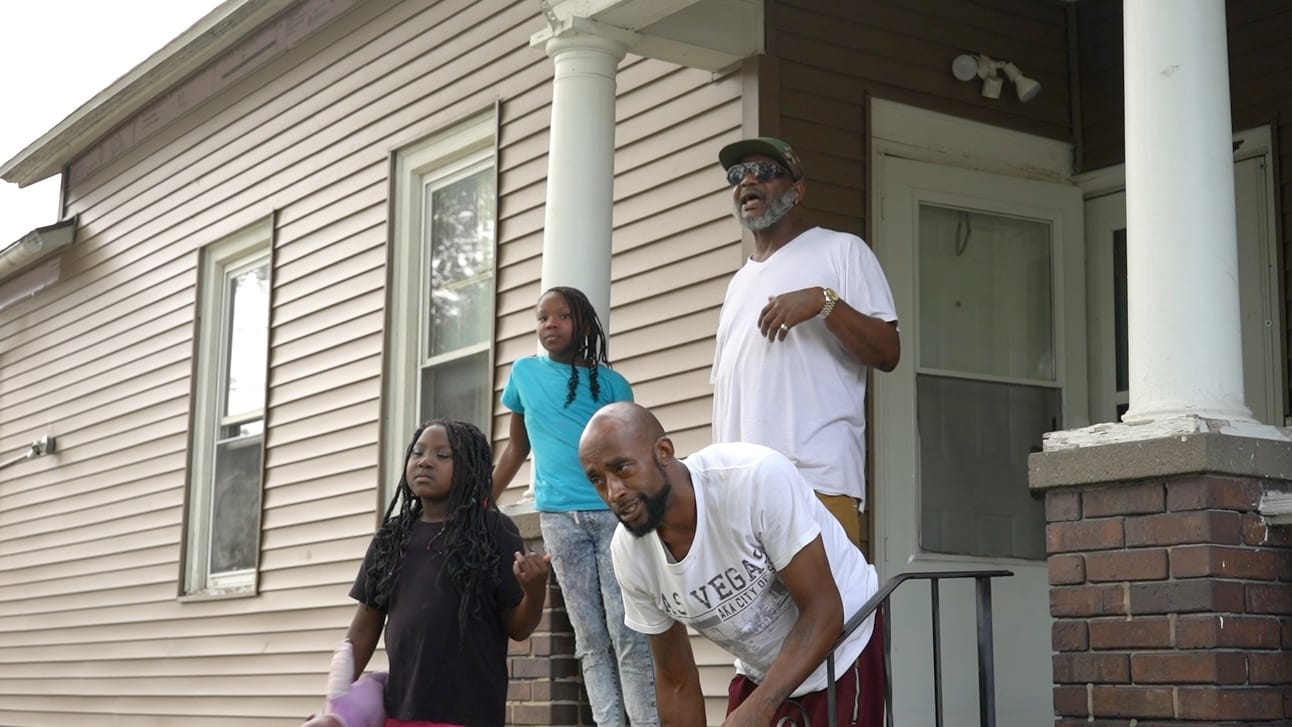
“All the jobs left here, all the jobs left here. Dried up,” one of the men said. “All the jobs left and now it's ganged out.”
“There definitely ain't no jobs if you got a felony,” one of the men added. “Even though Trump running for president though. How the hell he get found guilty of 35 felonies and he still get to run?”
“He got 28 felonies. We got two. And we can't get a job!” the other added.
One of the men said, “He a rich motherf**ker with power. He gonna buy his way in. He gonna buy his way in,”
What’d they think about Kamala?
“[Biden] got her to win them black votes, and I’m just being real about it. But…I think if she get in there, she’ll do something great for her people.”
Who did they think would win?
“[Trump] gon’ win. You know why? Because he peelin’ out dollars. He bought votes. There was pandemic money and shit. Motherf**kers don’t even understand what it’s gonna cost them in the future.”
“He gon’ start a war,” the other added. “A race war. He’s sneaky.”
“Trump ain’t sneakin’!” the other said. “He loud! He’ll tell you what the f*ck he finna do!”
The last person we spoke to was in a red durag feeding cats on his porch. A retired truck driver, he had moved to Saginaw from Alabama. He preferred Alabama because it’s “peaceful.”
“The gunfire here is at people. The gunfire there is at animals,” he explained.

He said he worried Saginaw would vote Democratic because “the elders are dying out quick,” but he hoped it would vote for Trump.
“I see what’s going on now…I see what Trump did when he was president. I know he’s crooked, I’m not dumb. But all of them are. They all lie…I don’t trust any of ‘em.”
But, he added, “I knew when Biden took over that it would go downhill and I was right. But I never thought it would affect me or my household, but it did.”

Editor’s Note
We’d like to thank our partner, Kalshi, once again for making today’s edition free for all readers. If you enjoyed it, we encourage you to subscribe for premium. We have original reporting like this up to three times every week.
Thanks to the dozens of you who wrote in about our Hurricane Helene coverage. Your support took the GoFundMe for Pablo Alday’s family to over $10,000, enabling them to hit their goal. Pablo sent this message of thanks:
Wow, you and the community are an absolute blessing. We are incredibly grateful for your generosity and kindness from you and your followers donating to my parents GoFundMe. Your contribution means the world to us during this challenging time.
It’s hard to express how much your compassion has helped ease the burden and lifted our spirits.
From the bottom of our hearts, thank you Roca News and the amazing community for standing with us.🙏❤️
We’ll be back in a couple days.
-Max and Max
RocaNews co-founders




